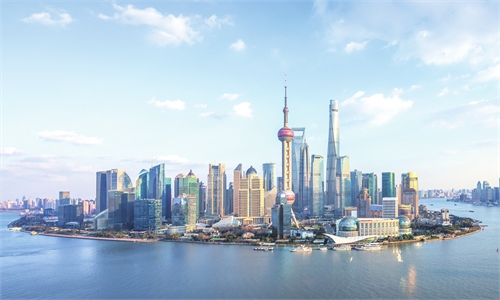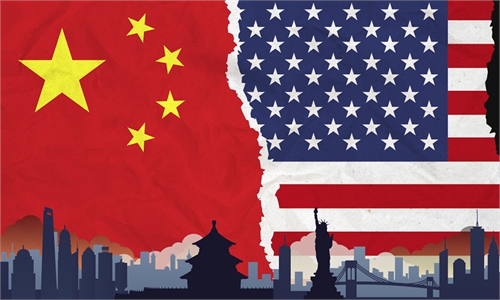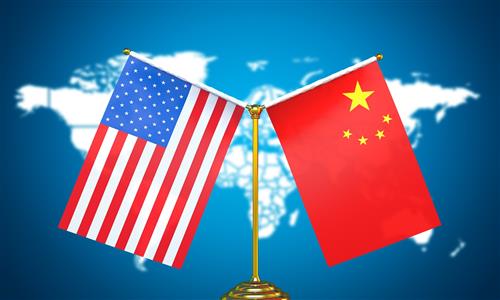
Illustration: Xia Qing/GT
Editor's Note:
At the beginning of 2024, predicting China-US relations has become a hot topic in major media outlets and think tanks. Mitch Presnick (Presnick), the founder of Super 8 Hotels China and former vice chairman of the American Chamber of Commerce in China, shared his views with Global Times (GT) reporters Su Yaxuan and Xing Xiaojing on his prediction on the challenges and development of China-US relations in 2024. "I'm a big believer in the future of the China-US relationship, even now, despite the challenges," said Presnick.
GT: You have lived in China for 30 years. Why did you decide to come to China, and why did you end up staying for so long?
Presnick: I was a big believer in China's reform and opening-up when I first heard about it. And this was when I was still in high school. In college, I decided to study Mandarin because I wanted to go to China. I was trying to think of a business that I could build in China. I thought I could bring the expertise from the US to China, and let Chinese partners and customers enjoy it.
I made a promise to myself that I would build bridges between the US and China and that's why I stayed for 30 years. I think there's no way I would have grown and become the person I am without my experience in China. I lived in China longer than I have lived in the US.
GT: You once said that the US "feels more and more like a fiefdom than a land of opportunity." What made you say that? Do you still feel this way?
Presnick: From when I was born, in 1966, until the time that I left for China, I think everybody in the US from any part of the country and from any political background would all agree that the middle class was the most important thing. For them it was vital to build up a middle class, protect it, and then make sure that was the stability point for the domestic economy because the US is a consumer economy. The best thing to have for a consumer economy is a stable, wealthy and growing middle class.
China understands this, which is why it's been urbanizing and developing a service economy and why it's been creating its own professional class of doctors, lawyers, accountants and investment bankers.
Unfortunately, in the US, the focus has shifted to a large degree to so-called job creators and wealthy interests - about 1 percent. The focus has moved away from the middle class, and as a result, the US has less of that basis of strength. So, I'd like to see us refocus on building a strong middle class and that's something that I think would be good for the US and also good for the US economy.

Mitch Presnick Photo: Courtesy of Presnick
GT: Some Western media outlets continuously emphasize China's economic decline and predict that the Chinese economy will struggle to improve in 2024. Are you confident in the Chinese economy in its current state? What problems is the current bilateral trade between China and the US facing?
Presnick: In the short term, I think China has a crisis of confidence, especially among consumers and entrepreneurs. But in the long term, I have a lot of confidence in the Chinese economy. I think, to a certain degree, China is handling short-term problems to avoid bigger long-term problems. For example, in the property market, China is rebalancing and moving away from reliance on manufacturing and exports. It wants to rely more on consumer spending domestically and services. I think all of that is a necessary transition.
China and the US are a symbiotic pair, like yin and yang. When you have a symbiotic pair, you must understand two things about a symbiotic pair. One is that it's beneficial for both sides, whether it's voluntary or not. The other is that you don't really have the ability to hurt someone without it coming around and hurting yourself. Everything that the US does to China inevitably comes around to hit itself, which is the same for China, and one thing that needs to be mentioned is that we're in the 21st century. We live in a hyperconnected world now, where information and technology are changing everything. Chinese and Americans need to find the best way to interact with each other.
GT: You once compared the US and China to "chess" and "go." You said "chess" is cunning and two-dimensional thinking, while "go" is timeless and elegant. Can you elaborate on this? What are the differences between the US and China in regard to their attitudes and approaches to international affairs?
Presnick: The US has a much shorter history, and its history is based on Western strategy, which is much more like chess. This two-dimensional thinking uses cunning and strategy to try to completely beat and eventually take the leader of the opposite team.
Meanwhile, China takes a much longer view of history and uses history much, much more comprehensively in how it plans. Go is about all stones having equal power, but together, they can win. The way they win is by just getting one more space than the other. It requires much longer-term thinking because you could be fighting a battle on this part of the board, and then you have to go. Just one little stone can make a lot of difference in the future.
I think it's important now that we, in general, take a page from China's strategy. One of the things that I've come to understand is that China has a long and proud history, and China has seen so many empires come and go. It has been incredibly successful and has created amazing inventions and amazing wealth. It showed a great deal of wisdom to me. China is so admirable that I thought it's impressive that such a proud country can also be willing to learn and to be really open. The US also needs to do that.
GT: You have mentioned the need for "fresh thinking to define a China-US relationship for the new era." What do you consider this "fresh thinking" to be and how can it be achieved?
Presnick: We're in the 21st century, and we need to understand things like artificial intelligence, climate change and public health. The US and China, no matter what the relationship between the governments, need both sides to understand that humanity also has to survive, not just our countries. This is the fresh thinking that we need to bring. It doesn't mean we can't have national security concerns and serious differences, but it also means that it's very narrow-minded to only think about the relationship in one way or another. It's a complicated relationship. Both of these nations either work together on global issues or no progress can be made on them.
GT: This year marks the 45th anniversary of diplomatic ties between China and the US. What expectations do you have for China-US relations in 2024?
Presnick: I think, first of all, there are going to be continued challenges. And in the US, 2024 is an election year, so that makes the relationship between the US and China more challenging.
Both countries are so intertwined in the global economy, that even if one side wants to decouple, that's impossible. Because if you're intertwined with the global economy and you try to decouple from the other country, you also have to isolate yourself from the global economy, and neither country is going to do that. I like a win-win and a positive sum much more than a zero-sum. That is always going to be my preference.
I'm a big believer in the future of the China-US relationship, and even now, despite the challenges, it's going to change. Everyone always talks about the differences between the US and China. But in fact, the similarities are far more interesting and far more comprehensive than people understand. I've always been an optimist about China, and I went to China and invested my entire career in it because of how much I believe in China and how much I believe in the hardworking ethic of Chinese people. I think that 2024 is going to be a mixed picture, but I'm expecting to see the Chinese economy, especially in the second half of 2024, start to stabilize and improve.



